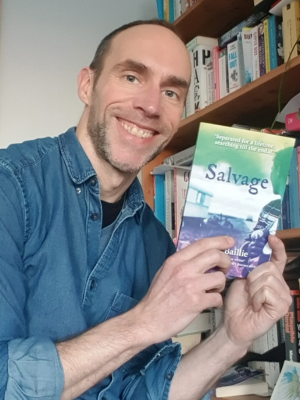Have you always been interested in publishing?

“I’d always been interested in books and writing but didn’t know of Edinburgh Napier’s Publishing programme until a friend told me about it. What appealed to me was the breadth of the course, how it covered many skills areas from editing and marketing, to rights and licensing. You could go from a tutorial on fanzine culture into a lecture on media law. The curriculum was tremendously varied.
“I remember one of my first assignments was to research what was at the time the new phenomenon of internet booksellers and the threat this posed to traditional bookshops. All the articles I found were full of stories about a strange new company called Amazon.
“27 years later, I’m glad I can walk along the high street and still see lots of book shops!”
Please describe your career from graduating until now.
“My first job after graduating was working as a publishing assistant at the Royal College of Surgeons. I was eventually promoted to head of the department and my role expanded along the way to include writing news and interview features.
“I’ve worked as a freelance writer and also done pro bono PR work for the charity Children First. Currently, I’m a communications manager at the University of Edinburgh on a large economic development project.”
Why did you decide to write Salvage?
“I’ve been interested in Gypsy-Traveller history for a long time. Both my grandparents on my dad’s side were from Traveller families.
“Salvage stemmed from an oral history I did with my grandad 18 years ago. After that I went on to trace my family tree back to the early 1800s. I read every history book I could lay my hands on about Gypsy-Travellers and wrote articles for family history journals but eventually felt I’d exhausted the subject.
“However, I returned to my granddad’s oral history notes five years ago for a podcast with the Living Memory Association. Afterwards, my interviewer said: ‘There’s definitely a book in there.’ The comment planted a seed, and I began using my granddad’s memories as inspiration for creative writing.”
What is Salvage about?
“Salvage is based on the little-known fact of the forced removals of Gypsy-Traveller children from their families. Removals went on around Scotland well into the 20th century but often weren’t well documented. It’s a scandal that is not widely known - which is why I knew it was a good theme for a novel.
“Set in 1983, Salvage tells the fictional story of ‘Nash’ Lacklow and his attempt to find out what happened to his sister, who was removed by officials 55 years earlier. Nash enlists the help of his great-niece, a student activist, who delves into old records, takes on prejudiced bureaucrats and slowly pieces together the mystery of what happened to Nash’s sister.
“So far, the reception has been fantastic. Salvage has picked up a lot of great reviews and was featured in Book Week Scotland’s 2024 showcase of debut novels.”
Tell us more about the process of getting your debut book published.
“Like many authors, there were a lot of rejections on the road to finally getting published. I spent a long time trying to get a literary agent, then changed tack and started approaching independent publishers and, thankfully, Tippermuir Books were interested.
“The skills I picked up at Edinburgh Napier undoubtedly helped through the process, from pitching the manuscript to agents and publishers, through the final editorial stages, and now with promoting the book. But I never dreamed back when I was a student that one day I’d be putting those skills to use as a published author!”
What does the future hold?
“I’ve discovered promoting a book is as big a task as writing it. But it’s also fun, so I’ll continue working with my publisher on promotion and publicity.
“I’ve got another two novels up my sleeve - one currently drafted at 80,000 words and one sitting at 50,000, and I keep jumping between the two, adding scenes and ideas. It would be great to get those published but at the moment I’m enjoying the thrill of being a first-time author.”
What advice would you give to someone wishing to follow in your footsteps?
“What’s taken me by surprise is how professional and personal interests can intertwine. But I think I was lucky in pursuing a qualification and line of work I enjoyed.
“Over and above that, my best advice is stay in touch with people even when your paths separate. Friends and contacts are important for a lot of reasons.”